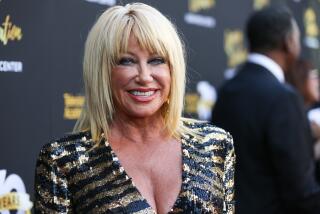Cancer Surgeon Who Founded UCLA Breast Center to Resign
- Share via
Dr. Susan Love, famed breast cancer surgeon, author and advocate for women’s health, is quitting patient care and resigning from the Revlon/UCLA Breast Center, which she brought to national prominence in four years as founding director.
“I have been caring for patients for almost 20 years and personally feel the need for a break in order to pursue other activities,” she said in a letter sent to 4,000 patients. Her last day on the job will be May 15, she said in an interview.
She said she plans to write a skeptical book about hormone replacement therapy, conduct research and possibly start a Los Angeles-based think tank for studying women’s health issues. Love would not confirm a UCLA colleague’s remark that she has also considered starting a for-profit consulting firm.
Love said she will retain an adjunct university appointment to continue federally funded research on methods for early detection of breast cancer. Dr. Robert Bennion, a surgeon, will become interim director of the Breast Center, which treats about 300 women a month.
“It’s difficult to assess how it will impact the center,” said administrator Leslie Laudeman, who added that Love’s patients will be referred to other doctors. Laudeman said she was “somewhat surprised and disappointed” by the announcement.
“I’m going to be very, very sorry to lose her as an immediate colleague in the care of patients,” said Dr. Patricia Ganz of UCLA’s Jonsson Cancer Center. Ganz described Love’s decision to move on as “midlife career change, a ‘what are you going to do with the rest of your life’ kind of thing.”
Love, 48, said that caring for so many women grappling with life-and-death questions has been a catalyst for altering her own life. “In breast surgery and cancer care, you realize how precious life is,” she said. “The only difference between you and the patient is luck.”
One of the first things that many cancer patients do to gain perspective is change jobs, she said. “Maybe that’s what I should do,” she remembered thinking.
The book she’s writing, tentatively titled “The Hormone Dilemma,” is a rather contrarian analysis of female hormone replacement therapy, she said. “I’m questioning the notion that menopause is a disease that needs to be treated,” she said, adding that doctors and the news media have “overestimated the benefits and underestimated the risks” of the therapy.
Her 1990 book, “Dr. Susan Love’s Breast Book,” has sold 300,000 copies.
As a surgeon, Love is a practitioner of what has traditionally been one of medicine’s least patient-friendly specialties. Yet she finds herself increasingly interested in the psychological and social dimensions of patient care and healing. Surgery, she said, “is quite a limited way to approach health problems. That’s one reason why I’m ready to move on.”
The think tank that she envisions--there are no firm plans yet, never mind funding, she said--might delve into such issues as the mounting tension between health care providers and patients. Ironically, she said, doctors are feeling more economic pressure to be brisk with patients just as research is showing that a more time-consuming type of care, emphasizing personal relations and family history, is often best. “I want to figure out new ways of looking at health” and develop alternative treatments that are “cost-effective,” she said.
Looking forward to a more holistic approach to her life, Love, who has a daughter, said she “plans to spend more time with my family and take piano lessons. If I’m not going to be operating, I might as well do something with my fingers.”






